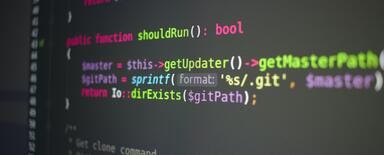
There are many programming languages. Developers can decide which one they want to learn and how. There are stationary and online courses available on the market. It's also possible to learn on your own using free materials – it all depends on individual preferences. Selecting the right language is extremely important. It’s worth choosing the one that is widely used and in high demand. As PHP development specialists, we'll be happy to tell you why it's worth learning this programming language.
PHP in short
PHP is an imperative, object-oriented, functional, procedural, reflective, interpreted (learn how a PHP interpreter works) and scripting programming language. That's a long definition, isn't it? Programming languages may employ many paradigms (programming patterns), and this is the case with PHP. Imperative programming means building a program that is a sequence of commands for your computer. In an object-oriented one, a program means a set of communicating objects containing data and having the ability to perform certain operations on this information. In the case of functional programming, the program is a complex mathematical function.
The original purpose of PHP was to build web servers, applications and websites. This language is used to create the application's backend - the part located on the server that the end user doesn't have direct access to. PHP is most often used to generate website code real-time and integrate it with a database. PHP scripts don’t run in the browser, they are only executed on the server. On our blog you will find an entry on all PHP versions released.
Is PHP easy to learn?
PHP is an open-source technology. The main advantage of the open character of the language is the ability to use the frameworks created in it for free. Then you can start learning PHP at any time convenient for you, without significant investments. Open-source languages also have another great advantage - they attract many programmers at different levels of development and careers, who are willing to share their knowledge on online forums as well as in Facebook discussion groups. The PHP community is also involved in the development of open-source technologies based on this language.
If you know languages like Java, C or Perl and are wondering what programming language to learn next, you should definitely consider PHP. Their syntax is quite similar, so you'll find it easier to understand PHP. Another thing that makes it easier is the fact that it's a dynamically typed language, which means that there are no strict rules for creating functionalities. This feature demonstrates the flexibility of PHP. The user may find different solutions to one problem.
You can learn PHP in many ways. A course where you obtain certification after completion is an option, but many developers learn on their own from podcasts, articles, and online training courses. In the case of this language, self-learning is facilitated by the extensive documentation of PHP and its frameworks.
You can also read about why it’s worth learning this language in the interview with our PHP developers.
There are many frameworks to facilitate the developer's work
Frameworks are a basis that facilitates and speeds up the work on an application. They offer numerous tools, libraries and scripts useful for building it. Every programming platform can be used by the developer for any project, however you need to remember that frameworks are created with specific challenges related to the type of built solution in mind. Therefore, they offer different tools and functionalities. The most popular PHP frameworks are certainly Symfony, Laravel, Codelgniter, Zend, FuelPHP and Phalcon.
The variety of frameworks created using PHP speaks in its favour. Developing applications using frameworks reduces the likelihood of errors, significantly speeds up and facilitates programming. PHP frameworks are open-source technologies, so using them is free.
What is PHP used for?
PHP and its numerous frameworks have many uses. The solutions created in PHP are efficient and practical. Many world-famous companies have used this language in their projects.
Creating CMSs
Many content management solutions have been written in PHP. By using this language and the tools based on it, you can easily create personalised CMS systems, tailored to the needs of specific companies.
When you think about content management systems, the most recognisable one probably comes to your mind - WordPress. The code written in PHP is responsible for the enforcement of all processes related to the functioning of WordPress in the model, controller and view (MVC) layers. The additional plugins and modifications that can be applied to the CMS in order to personalise this tool are also created in PHP.
Drupal is also written in PHP. Using this language positively influenced its speed and safety. The code created using PHP is organised in modules that are responsible for the CMS's functionality sets available to the user. Drupal is eagerly chosen as a solution for corporate websites. It’s often used in headless solutions, i.e. in conjunction with frameworks such as React and Angular.
Web development
Web development is the main use of PHP. Most websites were built using it. I'm talking here about websites of various types. PHP frameworks are often used to create complex e-commerce platforms. There are ready-made packages with functions which are useful when building such websites. PHP also has a module that facilitates database management. As a programmer, you'll have access to practical tools that will allow you to quickly build interesting websites.
Wikipedia gave up the engine created in Perl in favour of solutions built in PHP as early as 2002. Most of the code in the current Wikipedia software uses PHP 7.
Developing social networks
Learning PHP is worth considering if you’re interested in creating forums and social networks. Facebook was originally written in PHP. One of Facebook's major challenges was scaling and guaranteeing its users high performance.
Creating a fast-operating social networking site with many functionalities requires appropriate technology. In PHP 8 there is a solution that allows you to increase the efficiency of the products programmed in PHP - the JIT compiler. Improving the PHP efficiency makes it suitable for use in large projects.
Communication tools
Knowing PHP and its frameworks well, a developer can build various types of business solutions that will facilitate the company's daily work. An example of such a useful application is Slack, which facilitates internal remote communication in many organisations. It’s available as a mobile and web version. Its team uses PHP to support the backend. This language was used to create the technology known as the consistency check framework, which allows effective testing of the written code.
Is PHP worth learning? Summary
Due to its high popularity and many uses, PHP is definitely a programming language worth learning. Today it is appreciated and used by many companies. It's no wonder, considering that low hosting prices favour the development of startups. Knowledge of PHP will open up many opportunities for professional development and will allow you to find employment regardless of the form of collaboration you prefer (a job in a corporation or freelancing). Find out how we work on a daily basis, and what we expect from a junior/mid PHP developer who would like to join our team. If you are interested in developing your career in our company, check out what positions we are recruiting for, and in which projects you can take part.











